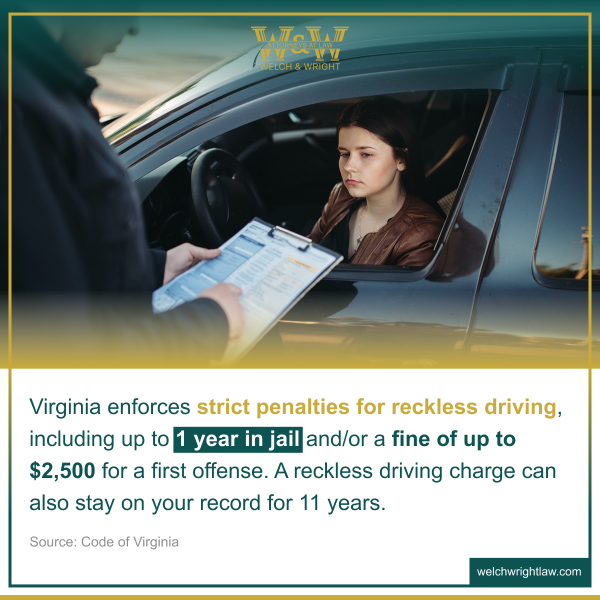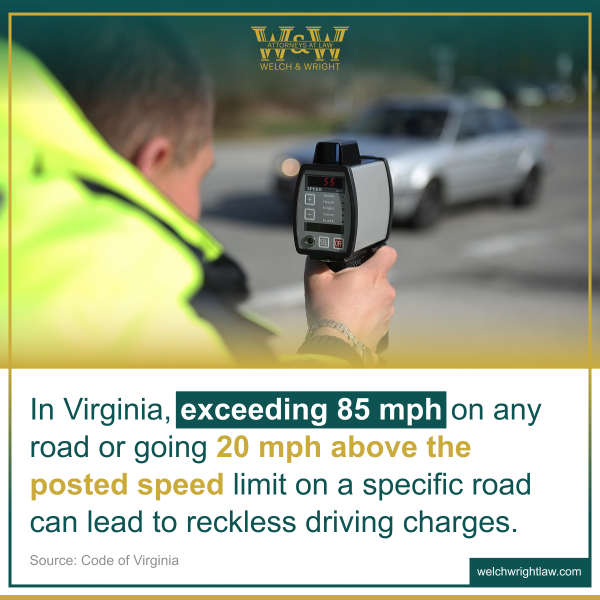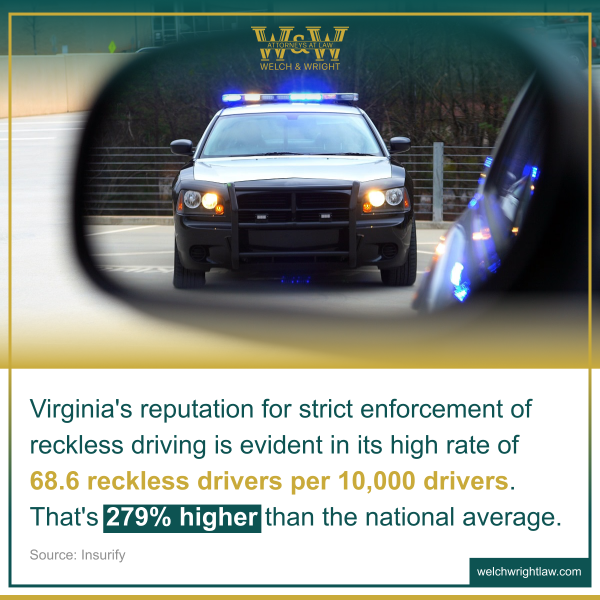Reckless Driving Defense Lawyers in Norfolk, VA
We represent people facing charges throughout the Hampton Roads region
Reckless driving is a type of criminal traffic violation that involves operating a vehicle with willful or wanton disregard for safety. The law considers reckless driving much more serious than mere carelessness (which is usually a civil matter). If convicted of reckless driving, you could be looking at significant fines, jail time, loss of your driver’s license, and a significant increase in your car insurance premiums.
If you’re facing reckless driving charges in Norfolk, Chesapeake, Newport News, Virginia Beach, or anywhere in the Hampton Roads region, the criminal defense attorneys at Welch & Wright, PLLC can help. We have the trial experience needed to fight for your rights in your reckless driving case. Contact us today for a free consultation.
Breaking down the definition of reckless driving in Virginia
There are numerous driving behaviors that can result in a reckless driving charge under Virginia law. In general, reckless driving is a class 1 misdemeanor that can result in a jail sentence of up to 1 year, a license suspension for up to 6 months, and a fine of up to $2,500. This charge is a major moving violation that results in 6 demerit points being placed on the defendant’s driving record and stays on their record for 11 years. Some types of reckless driving can carry harsher penalties.

Types of reckless driving in Virginia include:
- Driving with Obstructed View or Impaired Control
- Driving 2 Abreast in a Single Lane
- Passing 2 Vehicles Abreast
- Excessive Speed
- Driving Too Fast for the Conditions
- Failing to Yield When Approaching an Emergency Vehicle
- Passing a Stopped School Bus
- Racing
- General Reckless Driving
Reckless Driving – Driving with Obstructed View or Impaired Control
Va. Code Section 46.2-855 makes it Reckless Driving to drive a vehicle when someone’s view is obstructed or if there is a lack of control of the vehicle. This statute applies in two distinct situations.
The first situation is when the defendant is driving a vehicle that is overloaded to the point where they can no longer see out of the front of the vehicle or on the sides. Note, it does not apply when the car is so loaded that the driver loses view of the rear of their vehicle. This is presumably because of the sideview mirrors.
The second instance is when there are too many people in the front passenger seat and because of this, the driver’s view is impaired. This can theoretically be the case when there are two people in the front seat. The main issue is whether this obstructs the driver’s view. The defendant cannot be convicted on this code section if they can prove their view was not obstructed, although they still could be guilty of a different traffic infraction.
Reckless Driving – Driving 2 Abreast in a Single Lane
Va. Code Section 46.2-857 makes it Reckless Driving in certain circumstances to drive abreast of another vehicle in a lane marked for a single vehicle. To be abreast of one another means when two vehicles are side by side. So, this statute essentially makes it illegal to drive two vehicles in a single lane.
This code section does not apply in several circumstances. It does not apply for two 2-wheeled motorcycles to travel in the same lane in the same direction. It does not apply in any authorized parade, motorcade, or motorcycle escort. It also does not apply when the motor vehicle is in the same lane as bicycle, moped, or electric personal assistive mobility device (such as a powered wheelchair or scooter). If the vehicles are making a pass in a separate lane moving in the same direction, then this section also does not apply.
Reckless Driving – Passing 2 Vehicles Abreast
Va. Code Section 46.2-856 makes it Reckless Driving in certain circumstances when the defendant tries or makes a pass of two other vehicles that are abreast of one another. Again, to be abreast of one another means two vehicles are side by side.
There are two defenses to these charges. One is if the pass is made on a divided highway where there are three or more lanes going in each direction. In other words, you cannot pass two other vehicles moving together and side by side by driving on the shoulder of a road, or on a non-divided highway by driving on the opposite side of the road. The other defense is that one of the vehicles being passed is a bike, moped, or personal electric assistive device.
Reckless Driving – Speed
Va. Code Section 46.2-862 makes it Reckless Driving to drive at or above a certain speed threshold. To prove this charge, the only thing the Commonwealth needs to prove is that the defendant was driving a vehicle either above 85 mph on any road, or 20 miles or more above the posted speed limit on a particular road (for instance, driving 55 mph in a 35-mph zone).
There is no requirement that the Commonwealth prove the driver intended to drive at the speed or that they even knew of the speed. Ignorance of the speed limit is not a defense, and not being aware of your own speed is also no defense.

There are several ways the police officer can prove your speed to a judge. The first is with the radar on the front and rear of their vehicles. These radars go outwards in a cone shape and capture the speed of moving objects (i.e., motor vehicles). Second, police officers can clock someone’s speed with their (ironically named) LiDAR. This device uses a laser to instantly determine someone’s speed. It is extremely accurate. The third way is for the police officer to pace the vehicle. The police officer needs to have followed the vehicle at the same speed for at least a quarter of a mile in order for this method to be considered accurate.
It can be very difficult to disprove a Reckless Driving by speeding charge. There is room for human error on the police officer’s part, as there is for anything humans do. Usually, the only way to beat these charges at trial is by a technical defense, such as the radar or LiDAR not being calibrated. However, most police officers realize this defense and will therefore calibrate their devices before and after their shifts.
Reckless Driving – Driving Too Fast for Road Conditions
Va. Code Section 46.2-861 makes it Reckless Driving to drive at a certain speed that is considered too fast for current road conditions. Again, there is no need for the Commonwealth to prove that you intended to drive at that speed or that you were aware of your speed, only that you were going too fast for the conditions.
The conditions of the road at the time of the stop will determine whether or not someone was driving too fast. The most common reason this charge is given out is in situations where the weather is bad due to rain or snow. The road is slick and therefore even if someone is going the posted speed limit, the judge may deem it “too fast for road conditions.”
Again, there are three ways the police officer can prove your speed to the judge: using the radar on the front or rear of the vehicle, using the LiDAR device, or pacing the vehicle by following at the same speed for at least a quarter of a mile.
This charge is extremely subjective. Therefore, the facts of each individual case will be key in determining what is the best strategy for your case.
Reckless Driving – Failing to Yield When Approaching an Emergency Vehicle
Va. Code Section 46.2-861.1 outlines when reckless driving can be charged for failing to yield for certain emergency vehicles. The main purpose of this code section is to protect police officers who are conducting traffic stops. Every year, police officers are hit and killed by inattentive drivers who fail to obey this traffic law. Because of this, judges tend to take this code section very seriously.
A charge under this code section is most often brought in situations where the driver fails to move over into the far lane for a police officer who is conducting a stop of another vehicle. The police officer’s lights must be on and flashing. When approaching a police vehicle with its emergency lights flashing and conducting a traffic stop, the driver is supposed to move over into a lane not directly adjacent to the shoulder the police officer is stopped on. However, the driver is not required to do so if they cannot change lanes safely. Therefore, it can be a defense to this charge if there is heavy traffic and the driver cannot change lanes without causing an accident. In this case, the driver is supposed to slow down to a “safe speed for highway conditions.”
This code section is subjective in many ways. Therefore, the facts of each individual case are important in determining the best strategy for a defense.
In addition to the criminal charge of reckless driving, the code section also includes a lesser offense that is a traffic infraction, not a misdemeanor. The punishment under this subsection may only be a fine. Whether this subsection applies in your particular case can be determined and discussed by one of the attorneys at Welch & Wright.
Reckless Driving – Passing a Stopped School Bus
Va. Code Section 46.2-859 makes it Reckless Driving to pass a school bus that is stopped and either onloading or offloading children. This statute is meant to protect the safety of children and the elderly. These charges are taken very seriously by judges and depending on the facts of the case, could result in the very realistic possibility of an active jail sentence.
The code section requires any vehicle approaching from any direction to stop for a school bus when the school bus has its lights flashing and stop sign out and protruding and is discharging children or the elderly. The vehicle must remain stopped until all the people getting on or off the bus are cleared and the bus is back in motion.
This code section applies on highways, private roadways, and on school property. The school bus must be yellow, marked as a school bus, and have certain warning devices equipped and working in order to apply under this code section.
This code section does not apply when the school bus is stopped on the other side of a divided highway, an access road, or on a driveway where the highway, access road, or driveway is separated by a physical barrier or an unpaved area from the highway the defendant is driving on. This code section also does not apply if the driver is directed by law enforcement or a school crossing guard to pass a school bus.
Reckless Driving – Racing
Va. Code Section 46.2-865 makes it reckless driving to race another vehicle in the Commonwealth of Virginia. This includes any race on a public highway, interstate, or road and on the premises of any public church, school, recreational or business property unless authorized by the business owner. Due to their nature, these charges tend to be punished severely by the judges, and often a conviction will lead to an active jail sentence.

What constitutes “racing” is left for interpretation by the judges. Most races will involve at least two vehicles, and although high speeds are often associated with these charges, there is no requirement for the two vehicles to be going at a certain speed before it becomes racing. So, theoretically, two people could be convicted of racing even if they are only going slightly above the speed limit.
In most cases, the biggest indicators for a race are the statements made by the defendant to the police. Admitting that you were racing or trying to get in front of another car can be enough. Racing can also be inferred by the court based on the facts of the case, such as the speed, driving maneuvers and even the make and model of the vehicles.
In addition to the usual reckless driving penalties, in racing cases, the court can suspend your driver’s license for up to two years. The court will require the forfeiture of the defendant’s license and it will be disposed of permanently. The defendant will need to go to the DMV to receive another license at the end of the suspension period.
Reckless Driving – Generally
Va. Code Section 18.2-852 is a catch-all statute for reckless driving cases. All of the other Reckless Driving statutes refer to particular driving behavior (excessive speed, failing to yield, etc.), but this statute is particularly (and purposefully) vague so as to include any type of driving behavior that may be deemed “reckless” that does not fall under the other code sections. Usually, this charge is given out by police officers after car accidents, but this is not required.
To prove this charge, the Commonwealth needs to prove two things:
- that you were driving on a “highway” of the Commonwealth
- that you were driving “at a speed or in a manner so as to endanger the life, limb, or property of any person”
Va. Code Section 46.2-100 defines “highway” for the purposes of this charge. The term “highway” generally includes all public roads, streets, and interstates, and can even include parking lots and private property depending on the location.
The more nuanced element of this charge is proving someone’s driving behavior is “reckless.” As stated before, the code section is purposefully vague. Because of that, many Virginia cases have argued over what exactly constitutes “reckless” driving behavior. A decades-old case named Powers v. Commonwealth is still good law today and states that the mere occurrence of an accident, without more evidence, is not enough to convict someone for reckless driving. Prosecutors need additional evidence, which may include distracted driving, exceeding the speed limit excessively, or making dangerous driving maneuvers (such as abruptly cutting someone off).
It’s also important to note, although this charge is often given out for accident cases, there is no need for an accident to occur for this charge to be brought and for someone to be convicted.
The right defense attorney can help you fight a reckless driving charge
There are many defenses in these types of cases, and each is heavily reliant on the facts of each individual case. The attorneys at Welch & Wright have vast experience in these cases and have successfully fought and won these cases at trial. Depending on the circumstances, we may be able to get your charges reduced or dismissed entirely, or fight for a Not Guilty verdict in court. If you’re facing reckless driving charges in the Hampton Roads area, give us a call or contact us online for a free consultation with an experienced reckless driving attorney.
